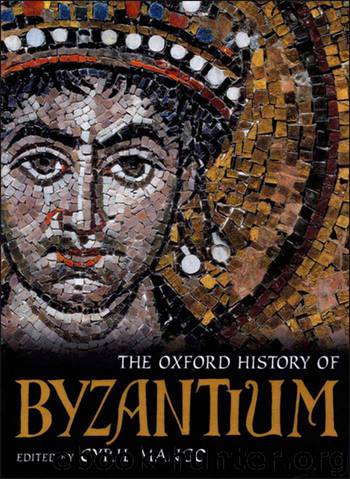The Oxford History of Byzantium by Cyril Mango

Author:Cyril Mango
Language: eng
Format: mobi, epub
Tags: Non-Fiction, History
ISBN: 9780198140986
Publisher: Oxford University Press
Published: 2002-12-05T00:00:00+00:00
Byzantium in the tenth century was realizing the benefits of the unglamorous strengths which it had built up in the struggle for survival in the seventh and eighth centuries, and which made it a model of cohesion and stability compared with the giants which had overshadowed it in 800. It was territorially more compact than either the Carolingian or the Abbasid state, and unlike them it was not a dynastic state; that is, it was not the creation of a dynasty and did not depend on dynastic continuity—or dynastic substitution—for its identity or its survival. Unlike most medieval empires, it was not held together by aggressive warfare to satisfy a military aristocracy’s need for land and booty. It had the religious unity which was lacking in the caliphate: the iconoclast controversy, ended by the final restoration of icons in 843, had forged a strong bond between orthodoxy and political identity. At the same time, Byzantium had the apparatus of government—a bureaucracy, a standing army, a comprehensive taxation system—which was largely missing in the Carolingian realm. Its imperial capital and its holy city were the same, which was not the case in either Latin Christendom or Islam. The Abbasid capital, Baghdad, may have matched or surpassed Constantinople as a showcase of wealth, learning, and palace power. But Constantinople was older by four hundred years; its buildings and rituals were visible proof that this was still the Roman empire of Constantine, however reduced, which had existed when the Franks and Arabs were barely known to history, and Baghdad had been a vacant site up-river from the capital of the now extinct Persian empire.
Facing: Basil II receiving the submission of his enemies as he is crowned by the archangel Gabriel and handed a lance by St Michael. Miniature of a Psalter, Venice.
Within the as yet unbreached walls of the ‘reigning city’, Byzantium had accumulated reserves of political culture unequalled outside the Far East. It is indicative of the strength that Byzantium derived from its past that the expansion of the tenth century coincided with a major governmental effort to retrieve and codify the written tradition of antiquity up to the sixth century, as well as the record, both written and oral, of recent military, ceremonial, and diplomatic practice.
At the death of Basil II in 1025, the empire stretched from Crete to the Crimea, and from the Straits of Messina and the River Danube to the Araxes, Euphrates, and Orontes rivers. The only foreign power that seriously disputed these frontiers was the German empire under Otto III’s successors, Henry II and Conrad II, who attacked Byzantine possessions in southern Italy and incited local rebels, but their base of operations was too far away for their intervention to be effective. The empire’s relations with two of its northern neighbours, the Magyars and the Rus, were on the whole improved by their conversion to Christianity at the end of the tenth century. The Rus received their Christianity from Byzantium, along with Basil II’s sister Anna as
Download
The Oxford History of Byzantium by Cyril Mango.epub
This site does not store any files on its server. We only index and link to content provided by other sites. Please contact the content providers to delete copyright contents if any and email us, we'll remove relevant links or contents immediately.
| Africa | Americas |
| Arctic & Antarctica | Asia |
| Australia & Oceania | Europe |
| Middle East | Russia |
| United States | World |
| Ancient Civilizations | Military |
| Historical Study & Educational Resources |
The Daily Stoic by Holiday Ryan & Hanselman Stephen(3301)
The Fate of Rome: Climate, Disease, and the End of an Empire (The Princeton History of the Ancient World) by Kyle Harper(3055)
People of the Earth: An Introduction to World Prehistory by Dr. Brian Fagan & Nadia Durrani(2730)
Ancient Worlds by Michael Scott(2682)
Babylon's Ark by Lawrence Anthony(2673)
The Daily Stoic by Ryan Holiday & Stephen Hanselman(2569)
Foreign Devils on the Silk Road: The Search for the Lost Treasures of Central Asia by Peter Hopkirk(2456)
India's Ancient Past by R.S. Sharma(2451)
MOSES THE EGYPTIAN by Jan Assmann(2412)
The Complete Dead Sea Scrolls in English (7th Edition) (Penguin Classics) by Geza Vermes(2277)
The Earth Chronicles Handbook by Zecharia Sitchin(2226)
Lost Technologies of Ancient Egypt by Christopher Dunn(2223)
24 Hours in Ancient Rome by Philip Matyszak(2078)
Alexander the Great by Philip Freeman(2064)
Aztec by Gary Jennings(2022)
The Nine Waves of Creation by Carl Johan Calleman(1915)
Curse Tablets and Binding Spells from the Ancient World by Gager John G.;(1860)
Before Atlantis by Frank Joseph(1849)
Earthmare: The Lost Book of Wars by Cergat(1823)
